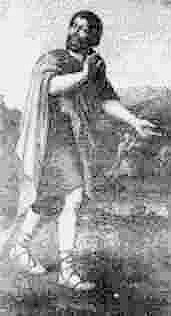SAINT ANDRIOU AND HIS MIRACULOUS BARRALET*
Pious grandmothers liked telling Saint-Andriou's legend. Here it is as it is preserved within a passing away generation. What we are going to say was never the object of a canonical inquiry. Legend is remained alive. It is enough not to let it die.
Andriou was born under the thatch. His life was used to help the humble and in the painful farming work. He drove the plough through the Gallinière's fields, farm near Béziers, on Murviel's road. He always waked up before the dawn. He sent to the sky many fervent prayers, asking salvation for all without any thought for himself.
The noise of the world expired at the entrance of his home. In the middle of fields, he sang moving canticles, he chanted the glory of Lord or that kind of plaintive ballads which charmed our forefathers' childhood.
His body was light, his soul glided over the earth.
Artless was his thought, large was his chastity.

Saint Andriou
But what ? he stops, he desists the work, he leaves the furrow he drawn !
He just has seen an unfortunate or tired man. It's a poor serf mistreated by his Lord and shaken by a vague instinct, unknow to him, since named Freedom. The modest hard-working man calls him with a sign, interrogates him and tries to ease the weight of his chains. He shows him a foreign happiness and promises to him he'll get, after terrestrial sufferings, an eternal repose.
Then, to fructify these consolations in the unfortunate's mind, he presents to him the barralet filled with an effective antidote against moral sorrows. This barralet, which probably contained only nasty wine, is now filled with good wine and do not empty any more.
Farther a pilgrim - swamped with fatigue and going to Béziers - arrives. Andriou asks him to stop, invites him to sit down on the lawn and listens with interest pious legends the foreigner brought from Orient and - with the barralet help - embellished with great faith miracles' stories.
Tradition adds : even bourgeois, knights and barons wanted to quench using the supernatural barralet. It claims too many gentlewomen did not disdain to apply - out of curiosity - their pinkish lips on the barralet.
This barralet was quite small, but it remained always full. Some envious persons tried to persuade the farm's boss that Andriou lavished the wine to anyone - and because of that he ran a risk of being ruined. This gullible boss went one day to surprise him while he had meal at feet of a hillock, behind a bush.
- I am thirsty, he says. Would you like to let me drink to your barralet?
- Gladly boss, the servant answered
The boss understood the false slanders steered against his faithful domestic when he was convinced the barralet did not empty.
But the day came where Galinière's fields were silent and covered with mourning. The saint had weakened. The night came and his companions were asleep. A sole lamp sparkled, suspended to the darkened wall. The saint was lying on the ground. He woke up a few moment to look the sky then his head fell again on his stony pillow : he wasn't any more. Suddenly, in Béziers, an heavy rumour circulates. Saint-Aphrodise's bells sounds their silvered tones without any human arm to shakes them.
It was possible to distinguish words in their aerial language :
Andriou es mort (Andriou is dead),
Es mort à la Galinheiro (he died in the Galinière's farm).
A voice asked : "Ount'ès" ? (where?)
another voice answered "Darrès uno peiro" (behind a stone).
The firsts who heard that did not believe their ears and imagined they were dreaming. This mysterious lamentation, ceaselessly repeated with bells, struck spirits. The priests and believers rushed in crowd to Galinière, surrounded with an holy light.
They approached the saint. The expression of his face offered a peaceful image. A halo shone on the head. Alas ! There were people able to keep - in this solemn moment - temporal ideas. For a long time Saint-Nazaire's parish and Saint-Aprodise' were in fight to know whether the farm of Galinière was depending to the one or the other.
The two parts agreed to let God's judgment to arbitrate. The body of the saint was placed respectfully on a rustic chariot pulled by oxen.
It was decided the Galinière would belong to the church where oxen would go by themselves. Two angels appeared and drove the oxen - with alight torches at the top of their horns - then the retinue stopped in front of the high altar. With that event, God ended dispute and saint Andriou's body rested for ever within Saint Aphrodise's church.
Saint Andriou was chosen as patron of muleteers and carters.
* a keg or a small barrel